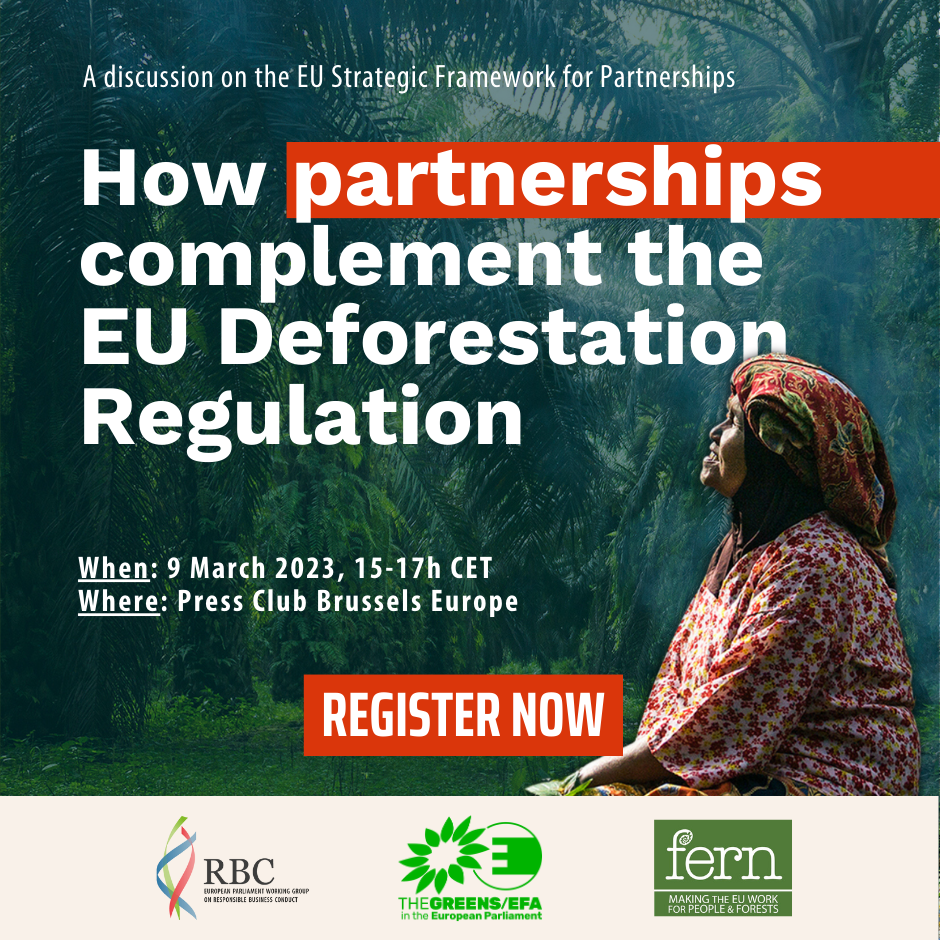A discussion on the EU Strategic Framework for Partnerships -> Join us at Press Club Europe on the 9th March at 15:00-17:00.
Register here for in-person or online participation !
Programme:
Welcome and introduction
– Heidi Hautala, Vice President of the European Parliament, Chair of the RBC WG, MEP Greens/EFA
Stepping up EU action beyond the European Deforestation Regulation – Time for partnerships
Panel:
Working in partnership to tackle deforestation in supply chains – Southern and European perspectives
– What should an EU Strategic Framework look like ?
– What are possible partnership options ?
Julia Christian, Fern
Presenting key point of the discussion paper “An EU strategic framework for working with countries to achieve deforestation-free production”
Panelists:
Pedro Miguel DA COSTA E SILVA, Head of the Brazilian Mission to the European Union
Camila POLO, Chargé d’affaires, Embassy of Colombia in Brussels
Adriana RAMOS, ISA in Brazil (Instituto Socioambiental)
Gita SYAHRANI, LTKL (Indonesia Sustainable District Association) (remotely)
Sebastian LESCH, German BMZ, Head of Unit on sustainable agricultural value chains, international agricultural policy, agriculture, rural development, innovation
Questions and Answers
Concluding remarks
Koen DOENS, Director-General DG INTPA
Commission’s vision on a comprehensive strategic framework for partnerships and reactions to previous interventions
*Cocktail reception*
During the event, producer country representatives, commission officials, MEPs and representatives of Member States and civil society will discuss next steps of engaging with producer countries, and what the process of developing a strategic framework could look like, who should be involved and what its content may be.
Panelists will also explore possible options of partnerships and discuss lessons learned from existing initiatives such as the Cocoa Talks. A delegation of CSO representatives from Brazil, Argentina and Paraguay visiting Brussels will attend this event and contribute to the discussions.
A political agreement regarding the EU deforestation-free products regulation (EUDR) was reached in December 2022. This new piece of legislation will regulate products linked to deforestation entering or exiting the European Union (EU) market aiming the reduction of the footprint of EU consumption on land and encourage the consumption of deforestation-free products by European citizens.
In the past years the European Parliament (EP) including the EP’s Responsible Business Conduct Working Group has been a dynamic actor contributing to the development of this EU landmark Regulation. With this event the RBC wg wishes to push forward the reflections on going beyond cleaning up EU supply chains but also engaging with all stakeholders in forested countries.
The aim is dialogue and partnership with all relevant stakeholders in producer countries, to work towards developing effective and complementary tools, which tackle also the root causes of deforestation worldwide.
The EUDR is only one element in EU’s comprehensive plan of action to address deforestation worldwide. Priority two of the 2019 European Commission (EC)’s Communication on Forests is to “work in partnership with producing countries” to support them in improving relevant national law and enforcement.
Article 28 of the EUDR specifically foresees that the Commission shall engage in a coordinated approach with producer countries and parts thereof in particular those identified as high-risk in the context of benchmarking via the use of existing and future partnerships, and other relevant cooperation mechanisms to jointly address the root causes of deforestation and forest degradation.
The Commission shall also develop a comprehensive EU strategic framework for such engagement and shall consider mobilising relevant EU instruments. Such partnerships and cooperation mechanisms shall focus on the conservation, restoration and sustainable use of forests, deforestation, forest degradation, and the transition to sustainable commodity production, consumption processing and trade methods. Partnerships and cooperation mechanisms may include, but are not limited to, structured dialogues, administrative arrangements, and existing agreements or provisions thereof, as well as joint roadmaps that enable the transition to an agricultural production that facilitates the compliance with the requirements of this regulation, paying particular attention to the needs of indigenous peoples, local communities and smallholders and ensuring the participation of all interested actors.
